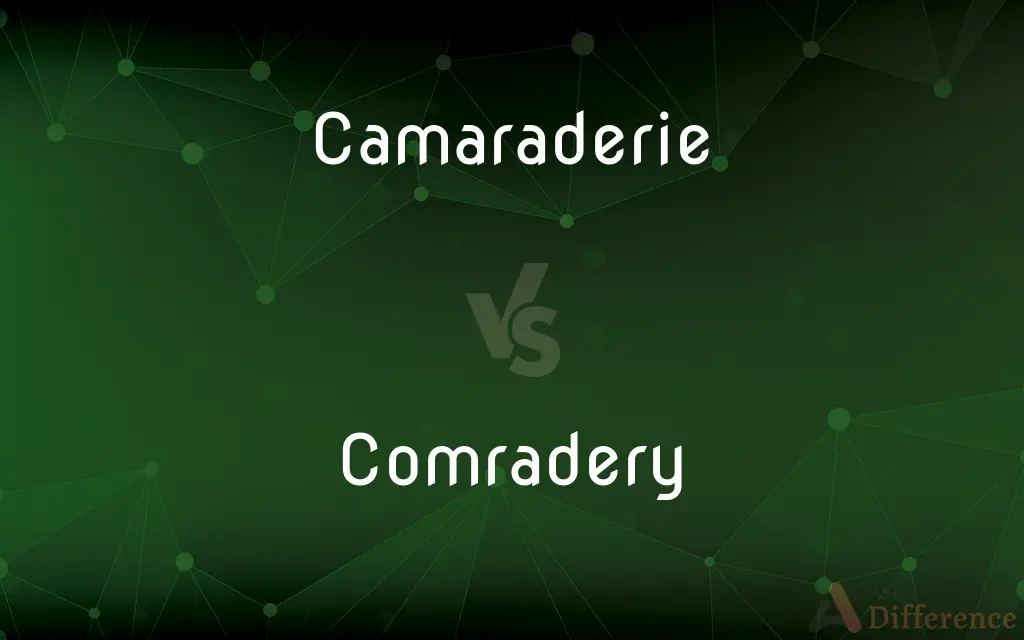Camaraderie vs. Comradery — What's the Difference?
By Maham Liaqat & Urooj Arif — Updated on March 17, 2024
Camaraderie involves a deep trust and friendship among a group, often forged in shared experiences, while comradery, a variant spelling, carries the same meaning but is less commonly used.

Difference Between Camaraderie and Comradery
Table of Contents
ADVERTISEMENT
Key Differences
Camaraderie is characterized by a spirit of friendship and mutual trust within a group, often resulting from shared experiences and struggles. This bond is typically seen in teams, military units, and workplaces. Comradery, on the other hand, represents the same concept of fellowship and mutual support but is considered a less traditional spelling of the term.
Camaraderie often implies a deeper level of connection and solidarity, forged through significant shared experiences that involve cooperation and collective effort. This depth is understood universally under the term camaraderie, whereas comradery, though conveying a similar sense of unity, might not be as instantly recognized due to its less frequent use.
In literature and formal writing, camaraderie is more widely accepted and used, reflecting a preference for traditional spellings that convey established meanings. Comradery, while understood, might be seen as a more modern or informal variant that could detract from the perceived formality or seriousness of a text.
Social contexts and cultural settings also play a role in the preference for camaraderie over comradery. The former is often associated with longstanding traditions and institutions, whereas the latter might be more commonly found in casual or contemporary discourse.
The choice between camaraderie and comradery can also reflect an individual's or group's preference for language that either adheres to traditional norms or embraces more flexible, evolving forms of expression. This choice can subtly influence how the underlying concept of mutual trust and friendship is conveyed and perceived.
ADVERTISEMENT
Comparison Chart
Spelling
Traditional spelling
Less common variant
Usage
Preferred in formal and literary contexts
May appear in more informal or modern contexts
Perception
Often associated with deep, established bonds
Can be seen as a more casual or modern expression of the same idea
Frequency in Usage
More commonly used and recognized
Less commonly used, leading to potential unfamiliarity
Cultural Association
Linked with traditions and long-standing institutions
Might be associated more with contemporary or casual settings
Compare with Definitions
Camaraderie
Mutual support within a group facing common challenges.
Soldiers often develop a strong camaraderie during their service.
Comradery
Fellowship or a friendly association.
There's a sense of comradery among the new students.
Camaraderie
A sense of close friendship and trust among a group.
The camaraderie among the team members made the challenging project enjoyable.
Comradery
Support and loyalty among friends or group members.
Despite their differences, their comradery never wavered.
Camaraderie
A spirit of good fellowship as among friends.
The club's meetings are filled with laughter and camaraderie.
Comradery
The bond shared by comrades.
The veterans reminisced about the comradery they shared during their time in service.
Camaraderie
Fellowship arising from shared experiences.
The difficult trek fostered a deep camaraderie among the hikers.
Comradery
Unity and cooperation within a group.
The team's success is attributed to their strong comradery.
Camaraderie
Solidarity among members of a group or community.
The community's camaraderie was evident during the charity event.
Comradery
A feeling of friendship and being part of a group.
Joining the club introduced him to a new level of comradery.
Camaraderie
Goodwill and lighthearted rapport between or among friends; comradeship.
Comradery
Camaraderie; comradeship.
Camaraderie
Close friendship in a group of friends or teammates.
Comradery
(rare) camaraderie
Camaraderie
A spirit of familiarity and closeness.
Comradery
The spirit of comradeship; comradeship.
"Certainly", said Dunham, with the comradery of the smoker.
Camaraderie
Comradeship and loyalty.
The spirit of camaraderie is strong among these riders of the plains.
Comradery
The quality of affording easy familiarity and sociability
Camaraderie
The quality of affording easy familiarity and sociability
Common Curiosities
What is camaraderie?
Camaraderie refers to a sense of close friendship, trust, and mutual support among a group, often forged in shared experiences.
Where is camaraderie most often found?
Camaraderie is commonly found in settings that require teamwork and cooperation, such as in sports teams, workplaces, and military units.
Can camaraderie exist in competitive environments?
Yes, camaraderie can exist in competitive environments as individuals come together to achieve common goals despite the competition.
Can comradery and camaraderie be used interchangeably?
Yes, they can be used interchangeably in terms of meaning, but camaraderie is the preferred spelling in more formal contexts.
Why is camaraderie important in a team?
Camaraderie fosters a supportive environment, enhances teamwork, and can improve morale and productivity within the team.
How is comradery different from camaraderie?
Comradery is essentially the same as camaraderie in meaning but is a less commonly used variant spelling.
How does camaraderie affect workplace culture?
A strong sense of camaraderie in the workplace can lead to increased job satisfaction, loyalty, and a positive work environment.
Do camaraderie and friendship mean the same thing?
While they are similar, camaraderie specifically refers to the bond within a group working towards a common goal, whereas friendship can be more personal and individual.
How can camaraderie be built within a team?
Building camaraderie can involve team-building activities, shared experiences, and fostering an environment of mutual respect and support.
Is comradery a modern term?
Comradery might be considered a modern variant, but it's more about spelling preference than a difference in era or usage.
How can leaders promote camaraderie?
Leaders can promote camaraderie by encouraging collaboration, recognizing team achievements, and creating opportunities for team members to bond.
Is comradery less formal than camaraderie?
Comradery might be perceived as less formal due to its less traditional spelling and occasional use in more casual or modern contexts.
What role does camaraderie play in military units?
In military units, camaraderie is crucial for morale, cooperation, and the effective functioning of the unit under stressful conditions.
Can too much camaraderie be detrimental?
While camaraderie is generally positive, excessive focus on social bonding can potentially distract from individual responsibilities or goals.
Can camaraderie lead to exclusionary behavior?
In some cases, a strong in-group camaraderie can unintentionally lead to the exclusion of others not perceived as part of the group, which can be counterproductive to inclusivity efforts.
Share Your Discovery

Previous Comparison
Prospective vs. Perspective
Next Comparison
Fav vs. FaveAuthor Spotlight
Written by
Maham LiaqatCo-written by
Urooj ArifUrooj is a skilled content writer at Ask Difference, known for her exceptional ability to simplify complex topics into engaging and informative content. With a passion for research and a flair for clear, concise writing, she consistently delivers articles that resonate with our diverse audience.
















































